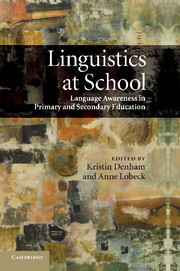Book contents
- Frontmatter
- Contents
- Notes on contributors
- Foreword: The challenge for education
- Introduction
- Part I Linguistics from the top down: encouraging institutional change
- Part II Linguistics from the bottom up: encouraging classroom change
- Part III Vignettes: voices from the classroom
- Introduction to Part III
- 16 And you can all say haboo: enriching the standard language arts curriculum with linguistic analysis
- 17 Code switching: connecting written and spoken language patterns
- 18 A primary teacher's linguistic journey
- 19 Why do VCE English Language?
- 20 Language lessons in an American middle school
- 21 The diary of Opal Whiteley: a literary and linguistic mystery
- 22 Using the Voices of North Carolina curriculum
- 23 A-level English Language teaching in London
- References
- Index
18 - A primary teacher's linguistic journey
Published online by Cambridge University Press: 04 August 2010
- Frontmatter
- Contents
- Notes on contributors
- Foreword: The challenge for education
- Introduction
- Part I Linguistics from the top down: encouraging institutional change
- Part II Linguistics from the bottom up: encouraging classroom change
- Part III Vignettes: voices from the classroom
- Introduction to Part III
- 16 And you can all say haboo: enriching the standard language arts curriculum with linguistic analysis
- 17 Code switching: connecting written and spoken language patterns
- 18 A primary teacher's linguistic journey
- 19 Why do VCE English Language?
- 20 Language lessons in an American middle school
- 21 The diary of Opal Whiteley: a literary and linguistic mystery
- 22 Using the Voices of North Carolina curriculum
- 23 A-level English Language teaching in London
- References
- Index
Summary
Introduction
In the fall of 2005 I began teaching at Willowwood Schoolhouse where linguist Kristin Denham was teaching linguistics once a week. That marked the beginning of my journey toward understanding the vital role of linguistics in school curriculums. Being a partner teacher in Kristin Denham and Anne Lobeck's National Science Foundation grant (see Lobeck, Chapter 14 in this volume) has been an amazing opportunity. During the past two years I have had the pleasure of learning from Kristin from watching her teach and also from our many discussions about linguistic concepts. I've been pleased to find how my background in English and my good teaching instincts have been guiding me to make many linguistically sound choices when teaching kids about language. However, I've also become aware that some of the ways I was teaching language skills and concepts could be much more effective when informed with a deeper linguistic knowledge. Being exposed to linguistics as a field of study has enriched my teaching both as a topic in and of itself and also where it lends itself so frequently to being incorporated into other disciplines. I have been a teacher in Grades 1–6 for the past twenty-three years. I've been vaguely aware that some of what I taught in Language Arts would be considered linguistics. I was definitely aware that I was venturing into linguistic territory in my extra lessons on things like Greek and Latin prefixes or words the English language adopted from Native American languages.
- Type
- Chapter
- Information
- Linguistics at SchoolLanguage Awareness in Primary and Secondary Education, pp. 244 - 250Publisher: Cambridge University PressPrint publication year: 2010
- 2
- Cited by

